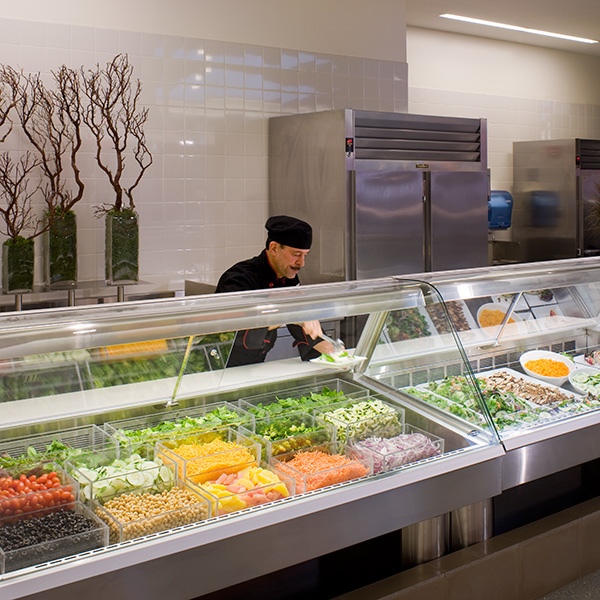Vegetarian and Vegan Options on Campus
 Photo provided by Northeastern University
Photo provided by Northeastern University
Throughout the dining halls on Boston’s campuses, students that decide to take the animal-free route embark on a challenge. Many students rely on campus dining halls for all of their meals. But what kind of dining options are available on campus?
“It was pretty hard initially just because of the options at the dining hall,” said Boston University junior Taylor Avery. “They have cliché images of what vegetarians like to eat. There are always vegetables and pasta, so I ended up eating cereal and salad every day.”
Boston University, along with other colleges in town, are improving their options on campus due to a rising trend in animal-free eating. On a recent night at BU’s West Campus there was vegan meatballs, at Warren Towers, a vegetarian roasted corn and potato soup, and at the new Marciano Commons, there were six vegetarian options and five vegan options. Some of the dishes included fresh greens and cherry tomatoes, cajun potato chips and baby spinach salad.
Across the river at Harvard University, the dining service website states, “Our menu includes selections at every meal for vegetarian and vegan diners, including soups, entrees, deli selections, and pasta sauces. These offerings are supplemented by the daily basic offerings such as at the grill and salad bar. Menu items are marked to make your dining selections easier.” There is also a special section dedicated to vegan and vegetarian nutrition education.
Crista Martin, director of marketing and communications at Harvard University, said the school looks for alternative sources of protein, even making their own seitan (a wheat gluten protein). “We are trying all kinds of dishes from around the world, as well as from different proteins.”
On a recent night, Harvard dining services offered 38 vegan and 18 vegetarian options. “The chefs are constantly trying new things and talking to other chefs. They look at popular cuisines around the world,” Martin said. “Their eyes are open to new ideas all the time.”
Massachusetts Institute of Technology provides vegan and vegetarian options at every dining hall on campus. In a recent week, they served 34 vegan and vegetarian dishes over the course of four days. Michael Myers, assistant director of MIT Dining, said there has always been vegetarian options on campus. But last year they changed their dining plans to resemble a traditional meal plan style rather than something that was more of a retail dining experience. During this transition, they were required to have expanded options of vegan and vegetarian meals. “The chefs and executive chefs are more flexible to develop menus than other large service providers,” Myers said. “They are encouraged to experiment. They receive feedback from the MIT community and parents.”
Jim Lachance, executive chef at MIT’s dining services provider, Bon Appetit, has worked with the company for 10 years, and says that the demand for vegetarian options has really grown as of late. “Even between this year and last year, there has been a difference. Last year we made food for 50 people on a vegan and vegetarian diet,” Lachance said. “This year we made between 75 and 100 meals and run out on some days.”
Lachance and his team find recipes in their extensive library of cookbooks and online and some even come out of their heads, like the black bean meatloaf they turned into a bean meatloaf for veggie lovers. They also test their recipes out on each other. “I don’t get around that much, but the feedback we get from students is that we are high up on the list and one of the best [vegetarian dining plans] in Boston.”
Students at Northeastern University are offered vegetarian options at International Village, vegan and vegetarian options at Levine Marketplace and some vegan and vegetarian options at Outtakes and Stetson West Eatery. Maureen Timmons, director of dining services at Northeastern, said the school meets with students once a month as part of a Food Advisory Board. “The students give us feedback and let us know how people are eating,” Timmons said. “They help drive the progression.”
Northeastern is always changing its menu and evolving, a process Timmons believes will never be done. Outside of her dining hall job, Timmons has spent time dining around the city and has found that almost everything can be modified easily to vegetarian or vegan. “There is an increased consciousness of dining options and campuses are reflective of this trend,” Timmons said.
One area students say can be improved is food options on the go. Heather Viola, a junior at Northeastern says, “You can buy a turkey sandwich anywhere, but it’s hard to find well-rounded vegetarian food on the go.”
At Simmons College, vegetarian options are offered at Bartol Hall. Laini Cassis, a junior at Simmons has been a vegetarian for six years says that as a vegetarian, there is plenty to work with at Simmons.“The dining halls separate all the food, so there is no chicken in the pasta and the meat is separated from the rest of the dishes,” Cassis says. “As a city, Boston is very open-minded to vegetarian and vegan diets. Simmons is following along with that.”
It is safe to say that Boston’s non-meat eaters don’t have to go far to find an appropriate meal.
Are you a vegetarian or vegan? How are the dining options on your campus?


